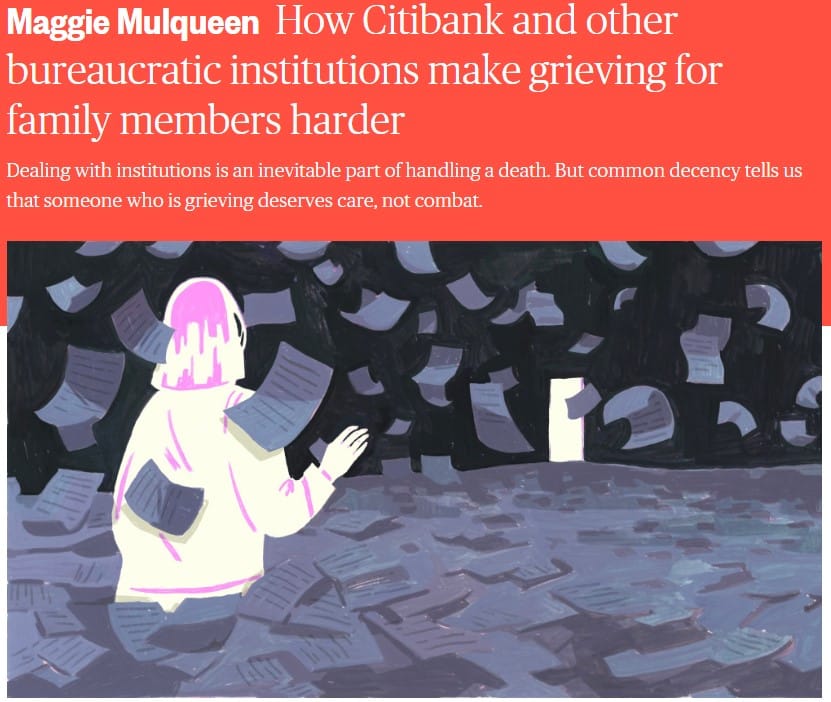
Originally, this was a post on Facebook. This is an update to that post. The update is at the end of the article.
The article above is an excellent article. I recommend it be read by those who have relatives with investment funds that they will have to manage on that relative’s death. The link to the article is right below the image.
The article does not express a one-time experience, but rather the common experience of all too many surviving relatives. My family has had the same experience with JP Morgan Chase. My stepfather and mother had a brokerage account and bank accounts with both branches of this rather large group, a brokerage account with JP Morgan and bank accounts with Chase. When my stepfather died, my mother filed all appropriate paperwork, or at least she thought she did. She came to live with us four years ago, and my wife and I realized recently that her Chase bank accounts still have my stepfather’s name on it. We thought that it would be easy to remove his name. After all, we have copies of his death certificate from 9 years ago. We thought that his name on the account was a probable oversight, or simply some lost paperwork.
His name is still on the account. After filing numerous pieces of paperwork, “they” refuse to remove his name. He has been dead for 9 years. At one point, in 2019, Chase insisted on a personal visit. They refused to accept a notarized letter prepared by an attorney on my mother’s behalf. In 2019, there was no Chase bank in Alabama, so my wife had to travel to another state to deliver the paperwork. They assured my wife that we had submitted almost everything, to simply send a death certificate to them. We had to contact the State of Florida, get a new death certificate and send it to them. By now you will not be surprised to know that nothing happened after our submission.
It is 2020, there is now a Chase bank in Alabama, nearly two hours away. There is no close bank to which to travel to finish their incessant paperwork. We are approaching 10 years after my stepfather’s death and are still unable to get Chase to complete the paperwork. We get runaround after runaround. My mother is now entering the phase in her life in which we have needed to get powers of attorney from her to help her manage her affairs. It is sad to see her mental capacity decrease. Eventually, she will pass away as she is in her late 90s. When that happens, I am faced with the prospect of trying to convince Chase that both my stepfather and mother have died. Given their prior record, and given that I am approaching 70, I can easily see it taking until my 80s to resolve the death of both my stepfather and my mother.
The article above is accurate. But, it is not only Citibank that delays the acceptance of someone’s death. JP Morgan Chase does as well. The author below is careful to ascribe the blame to bureaucracy. I am more sanguine than her since the other accurate truth is that in keeping the money, both her bank and JP Morgan Chase continue to earn profits from the money of a dead person.
Yesterday, Chase turned down another round of paperwork. Though they said it was fine to fax a power of attorney, they now claim that they could not see the notary stamp with absolute clarity. Even though the branch manager for Chase had said it was OK to fax it in, someone up the line decided it was not. As with the article above on Citibank, there seems to be no way to satisfy all their requirements. Our mother is near to needing a nursing home. She actually has the money to do so in her JP Morgan account. Well, except that it has my stepfather’s name on it and “they” are finding reasons to not remove his name and to give her, and her representatives, full control of the funds. So, we are approaching a decade after my stepfather’s death and are still unable to find a way to fully satisfy JP Morgan Chase. Welcome to death in modern America.



Leave a Reply